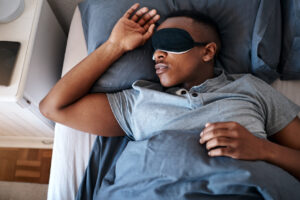When you buy through our links, we may earn a commission. Products or services may be offered by an affiliated entity. Learn more.
Is Narcolepsy Genetic?
Most cases of narcolepsy occur in people with no family history of the condition. However, narcolepsy can have a genetic component. Having certain gene variations can make a person more susceptible to developing narcolepsy.
Narcolepsy always involves excessive daytime sleepiness and may cause other symptoms. It affects approximately one of every 2,000 people in the U.S. Experts are not sure what causes narcolepsy, but genetics can play a role.
Do Genetics Have a Role in Narcolepsy?
Genetics have a role in narcolepsy, but genetics alone do not determine whether a person will develop narcolepsy. The exact cause of narcolepsy remains unknown, but evidence suggests that multiple factors, including genetics, affect the likelihood of having narcolepsy.
Narcolepsy usually arises without a link to any family history. That said, a family history increases the risk of having narcolepsy, and in rare cases, it can run in a family.
Narcolepsy is categorized into narcolepsy type 1 (NT1) and type 2 (NT2). In NT1, symptoms occur because specific cells in the brain stop producing a chemical called orexin that supports wakefulness. Experts believe this happens because of an autoimmune reaction in which the immune system attacks the body’s own cells.
“Narcolepsy at its core is a debilitating chronic neurological condition with sleep-wake state instability.”
Dr. Abhinav Singh, Sleep Medicine Physician
This autoimmune reaction may occur because of both genetics and environmental factors. More than 95% of people with NT1 have variations in a gene involved in immune function called HLA-DQB1. However, not everyone with this gene variation develops NT1.
Some researchers believe that gene variations can cause a predisposition to NT1 that can be triggered by certain infections or environmental exposures.
More research is needed to understand exactly how genetics and other factors affect the development of NT1. In addition, experts know little about how NT2 occurs or whether it has a genetic component.
What Are Other Causes of Narcolepsy?
While generally believed to be caused by a mix of genetic and environmental factors, narcolepsy can result from other triggers, including:
- Stroke
- Brain tumors
- Infection
- Changes in hormones, such as menopause or puberty
“Given that symptoms often overlap with other conditions, the diagnosis and treatment of narcolepsy often gets delayed. This may also be the reason why its prevalence is likely underestimated.”
Dr. Abhinav Singh, Sleep Medicine Physician
What Are Narcolepsy Symptoms?
The hallmark symptom of narcolepsy is excessive daytime sleepiness. Even if they get sufficient sleep, people with narcolepsy may experience overpowering drowsiness at multiple points during a normal day. This can lead to “sleep attacks” when they suddenly fall asleep, which may happen during unsafe or inappropriate times.
Other symptoms of narcolepsy can include:
- Cataplexy:Cataplexy involves recurring episodes of sudden and brief loss of muscle control. Cataplexy only affects people with narcolepsy type 1.
- Sleep paralysis: About 25% of people with narcolepsy have episodes of being unable to move their limbs despite being consciously awake. Sleep paralysis happens right after waking up or falling asleep.
- Hallucinations: People with narcolepsy may have visual or auditory hallucinations when falling asleep or waking up.
- Disrupted evening sleep: Fitful sleep can affect people with narcolepsy, and it may be related to extremely vivid or bothersome dreams.
Only about 1 in 10 people with narcolepsy have all of these symptoms. In most cases, symptoms first arise between the ages of 15 and 30. The diversity of symptoms is believed to be a consequence of the irregular rapid eye movement (REM) sleep periods experienced by people with narcolepsy.
How is Narcolepsy Diagnosed?
Narcolepsy can only be diagnosed by analyzing the results of specialized sleep testing, including an overnight sleep study and the Multiple Sleep Latency Test (MSLT).
During these tests, sensors are used to track brain waves, muscle activity, and breathing. This allows this testing to identify abnormalities in REM sleep that are associated with narcolepsy. These tests can also measure how quickly a person falls asleep, which is known as sleep latency.
Sleep testing can rule out other causes of excessive sleepiness, including other sleep disorders. Sometimes doctors recommend imaging tests to make sure that symptoms are not being caused by a brain injury.

Still have questions? Ask our community!
Join our Sleep Care Community — a trusted hub of sleep health professionals, product specialists, and people just like you. Whether you need expert sleep advice for your insomnia or you’re searching for the perfect mattress, we’ve got you covered. Get personalized guidance from the experts who know sleep best.
References
5 Sources
-
A.D.A.M. Medical Encyclopedia. (2021, July 26). Narcolepsy. MedlinePlus., Retrieved September 29, 2023, from
https://medlineplus.gov/ency/article/000802.htm -
A.D.A.M. Medical Encyclopedia. (2018, June 1). Narcolepsy. MedlinePlus., Retrieved September 29, 2023, from
https://medlineplus.gov/genetics/condition/narcolepsy/ -
Scammell, T. (2023 October). Clinical features and diagnosis of narcolepsy in adults. In R. Benca & A. Eichler (Ed.). UpToDate., Retrieved November 10, 2023, from
https://www.uptodate.com/contents/clinical-features-and-diagnosis-of-narcolepsy-in-adults -
Ollila H. M. (2020). Narcolepsy type 1: what have we learned from genetics?. Sleep, 43(11).
https://pubmed.ncbi.nlm.nih.gov/32442260/ -
Schwab, J. (2022 September). Narcolepsy. Merck Manual Consumer Version., Retrieved September 29, 2023, from
https://www.merckmanuals.com/home/brain,-spinal-cord,-and-nerve-disorders/sleep-disorders/narcolepsy









